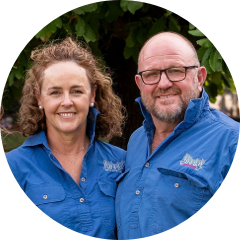Long-term trials of drought resilient farming practices in Victoria
Term
2024-2027
Project Officer
Jane Mcinnes
WHY THIS PROJECT IS IMPORTANT
Drought is an inescapable part of the Australian landscape and it is important farming businesses are well prepared for its impacts.
This project is trialing a number of farming systems adaptations that have the potential to improve drought resilience in broadacre grains, grazing and mixed farming businesses across Victoria and Tasmania. The project involves both replicated and demonstration trials, which are being used to trial and showcase innovative practices that can support farming businesses before, during and after drought.
As part of this project, a central trial site at The University of Melbourne’s Dookie Campus has been established to evaluate several agronomic and systems practices thought to improve drought resilience. This central site is being complemented by three satellite trials and multiple on-farm demonstrations, with the central trial site also being used to test future scenarios by applying artificial heat waves.
Combining data from multiple replicated and demonstration trials with climate projections generated through modelling and analysis, aims to identify adaptations to mixed farming systems and practices that may improve drought resilience and its associated risk management. The project also includes a social research element to investigate pathways and barriers to the adoption of practices, which will be used to inform the extension work carried out by Riverine Plains during the project.
It is expected that this project will benefit grains, red meat and wool industries directly, as well as contribute to the extension of drought resilient options for diary and fodder producers.
Project focus
In 2025 Riverine Plains established a 9.5 ha demonstration site at Murchison in Victoria, sown to a mix of Morava vetch (at 40 kg/ha) and Wintaroo oats (at 14 kg/ha). The paddock was previously sown to wheat in 2024 and canola in 2023.
Two demonstrations were conducted in the one paddock, one focused on grazing effects and one on the end product. The treatments were applied to the vetch and oats mix in the first year. These were
-
Grazed v Not Grazed, and
-
Brown Manuring v Hay.
Results from this trial will be available shortly, with Riverine Plains also planning a range of extension activities to extend findings from the central hub trial at Dookie.
Riverine Plains is also delivering a similar project in NSW, which involves two demonstration sites in NSW and activities to extend findings from the Wagga Wagga central hub trial.
The central hub sites at both Dookie, Victoria and Wagga Wagga, NSW, consist of replicated ‘mini farms’ which represent different farming systems. Over four years, these “mini farms” will be sown to crop and pasture species according to the farm system they represent, with soil, plant and livestock measurements collected as the rotations progress. The data collected will be used in modelling software to integrate agronomic and economic comparisons of each system.
For the duration of the project (2024-2027), Riverine Plains will use findings from the central hub trials, as well as input from members and advisors, to shape paddock-scale demonstrations of practices that could benefit farmers in the Riverine Plains.
Dookie, Victoria, Central Hub Long-Term Trial
The first year of the Victorian central hub trials were sown in April 2024, at The University of Melbourne’s Dookie Campus. Over four years, these large (0.36 ha) plot replicated trials will be sown to crop/pasture treatments according to the rotation of the farming system they represent.
The four systems and their treatment rotations are:
- Intensive cropping – canola and spring wheat
- Mixed farming with annual pasture – vetch, dual-purpose canola, and winter wheat
- Mixed farming with ley pasture – two years of clover, dual-purpose canola, and winter wheat
- Grassland (native pasture)
The two mixed farming systems will be grazed by sheep, representing a self-replacing flock.
Riverine Plains is delivering the engagement and extension activities for the Dookie Central Hub Trial via field days and events, as well as through our publications and online channels.
We are eager to hear from our farming members and industry professionals about any ideas you may have for demonstration trials, the central hub trials or suggestions for improving this project.
Find out more
For further information, please email jane@riverineplains.org.au
Project investment
Partners
This project is led by The University of Melbourne and includes project partners Riverine Plains, Birchip Cropping Group, Southern Farming Systems, The University of Tasmania and Federation University Australia.
MORE ON Grains & Livestock
Our research enhances food production, increases environmental resilience and improves community connection across the Riverine Plains. See how our research creates impact.
-
Grains
Sustainability
-
Livestock
Sustainability
-
Grains
Business
-
Grains
Sustainability
-
Grains
Livestock
-
Grains
Sustainability
-
Grains
Business
-
Drought
Livestock
-
Grains
Sustainability
-
Grains
-
Grains
-
Drought
Livestock
-
Soils
Grains
-
Livestock
Fodder
-
Grains
Soils
-
Drought
Grains
-
Soils
Grains
-
Grains
-
Livestock
Drought
-
Drought
Livestock
-
Drought
Livestock
-
Grains
Soils
-
Soils
Grains
-
Fodder
Grains
-
Grains
-
Grains
-
Grains
Soils
-
Sustainability
Grains
-
Grains
Sustainability
-
Soils
Grains
-
Grains
Sustainability
-
Livestock
Grains
-
Grains
Soils
-
Sustainability
Grains
JOIN RIVERINE PLAINS
Riverine Plains provides opportunities to see new research and innovation, connect with rural communities, and attend informative events.


